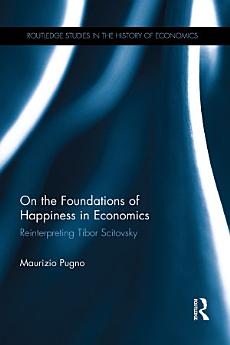On the Foundations of Happiness in Economics: Reinterpreting Tibor Scitovsky
About this ebook
Given the recent rise of behavioural economics and happiness economics, this book aims to show how far ahead of his time Scitovsky was in his work on individual welfare (or wellbeing). It traces the evolution of Scitovsky’s original thought, arguing that he has been frequently misunderstood, before undertaking formal analysis in order to demonstrate how far his work anticipated or even went beyond the recent advances in economics. This volume also explores Scitovsky’s work in the context of Keynes’ work on wellbeing, offering a new perspective on welfare in the history of economic thought. Other issues discussed in this text regard creativity and social skills, hedonism and eudaimonia, parenting and education, addiction, work/leisure balance, policies for happiness, paternalism, and the quality of economic growth.
This book addresses a variety of readers, such as those interested in the history of economics, as well as students and researchers concerned with the economic theory of well-being.
About the author
Maurizio Pugno is Professor of Economics at the University of Cassino, Italy.




